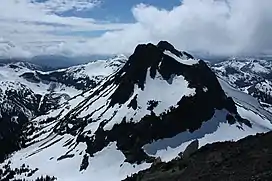Coquihalla Mountain
Coquihalla Mountain is an extinct stratovolcano in Similkameen Country, southwestern British Columbia, Canada, located 10 km (6.2 mi) south of Falls Lake and 22 km (14 mi) west of Tulameen between the Coquihalla and Tulameen rivers. With a topographic prominence of 816 m (2,677 ft), it towers above adjacent mountain ridges. It is the highest mountain in the Bedded Range of the northern Canadian Cascades with an elevation of 2,157 m (7,077 ft) and lies near the physiographic boundaries with the Coast Mountains on the west and the Interior Plateau on the east.
| Coquihalla Mountain | |
|---|---|
 Eastern flank of Coquihalla Mountain | |
| Highest point | |
| Elevation | 2,157 m (7,077 ft) |
| Prominence | 816 m (2,677 ft) |
| Listing | List of volcanoes in CanadaList of Cascade volcanoes |
| Coordinates | 49°31′30.0″N 121°03′36.0″W |
| Geography | |
| Location | British Columbia, Canada |
| District | Yale Division Yale Land District |
| Parent range | Bedded Range |
| Topo map | NTS 92H11 Spuzzum |
| Geology | |
| Age of rock | 22 million years |
| Mountain type | Stratovolcano |
| Volcanic arc/belt | Pemberton Volcanic Belt Canadian Cascade Arc |
| Last eruption | 21 million years |
Geology
Coquihalla Mountain is a major preserved feature in the Miocene age Pemberton Volcanic Belt that was erupting about 21 to 22 million years ago.[1][2] Like the Pemberton Volcanic Belt, Coquihalla Mountain formed as result of Cascadia subduction.
See also
References
External links
- "Coquihalla Mountain". Geographical Names Data Base. Natural Resources Canada. Retrieved 2010-06-02.
- "Coquihalla Mountain". Bivouac.com. Retrieved 2010-06-02.
- "Coquihalla Mountain, British Columbia". Peakbagger.com. Retrieved 2010-06-02.
- "Coquihalla Mountain". BC Geographical Names.
- Geology of the Coquihalla Volcanic Complex, southwestern British Columbia